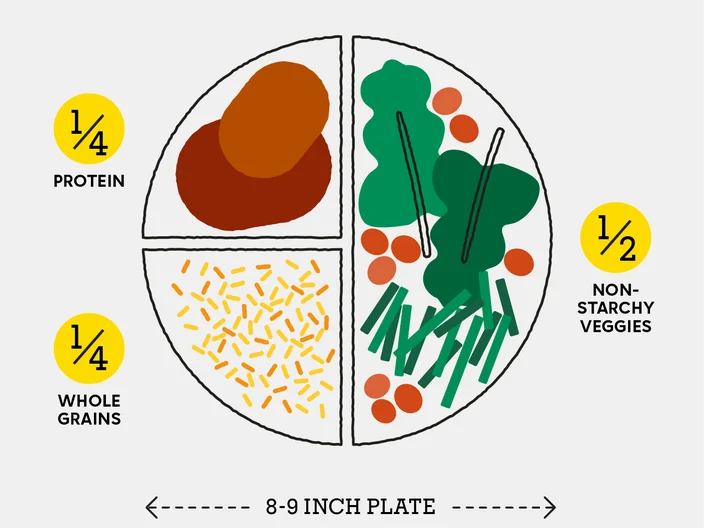
Managing diabetes requires a carefully planned diet, as food choices play a crucial role in maintaining stable blood sugar levels. Diabetic patients must focus on a balanced diet that includes the right combination of carbohydrates, proteins, and healthy fats. While many believe that avoiding sugar is the only solution, true diabetes management is about nutrient-rich eating that prevents complications and supports long-term health.
In this guide, we’ll explore the best nutrition strategies for diabetic patients, helping you make informed dietary choices for better glucose control and overall well-being.
1. Choose Low-Glycemic Foods for Better Blood Sugar Control
The glycemic index (GI) ranks foods based on their impact on blood sugar levels. Diabetic patients should focus on low-GI foods that help maintain steady glucose levels and avoid sudden spikes.
🔹 Best low-GI foods:
- Whole grains (quinoa, oats, brown rice)
- Leafy greens (spinach, kale, Swiss chard)
- Non-starchy vegetables (broccoli, zucchini, bell peppers)
- Berries, apples, and pears
- Nuts, seeds, and legumes
🔹 How to include them in your diet:
- Swap white rice for quinoa or brown rice.
- Choose whole fruits instead of fruit juices.
- Replace sugary snacks with nuts, Greek yogurt, or hummus.
✅ Pro Tip: According to Harvard Health, fiber-rich foods slow sugar absorption, helping prevent blood sugar spikes.
2. Balance Carbohydrates to Prevent Blood Sugar Fluctuations
Carbohydrates have a direct impact on blood sugar levels, but eliminating them entirely is not the solution. Instead, focus on complex carbs and balance them with protein and fiber.
🔹 Best carbohydrate sources:
- Legumes (lentils, chickpeas, kidney beans)
- Whole grains (oats, bulgur, barley)
- Sweet potatoes (moderation)
🔹 Carb management tips:
- Follow portion control and eat smaller, frequent meals.
- Pair carbs with protein (e.g., whole-grain toast with peanut butter).
- Avoid refined carbs like white bread, sugary cereals, and pastries.
✅ Pro Tip: Studies from the American Diabetes Association show that protein and fiber slow glucose absorption, keeping blood sugar levels more stable.

3. Incorporate Lean Protein for Sustained Energy
Protein helps stabilize blood sugar levels, reduces cravings, and supports muscle maintenance.
🔹 Best sources of lean protein:
- Skinless poultry (chicken, turkey)
- Fatty fish (salmon, sardines)
- Eggs and low-fat dairy
- Tofu, tempeh, and beans
🔹 How to add more protein:
- Choose grilled chicken over fried options.
- Snack on boiled eggs or almonds instead of chips.
- Add tofu or legumes to soups and salads.
✅ Pro Tip: A protein-rich breakfast prevents mid-morning sugar crashes and keeps you full longer.
4. Select Healthy Fats to Support Heart Health
Diabetic patients have a higher risk of heart disease, making healthy fats essential for reducing inflammation and improving cholesterol levels.
🔹 Best sources of healthy fats:
- Avocados
- Nuts (almonds, walnuts, pistachios)
- Olive oil & coconut oil
- Fatty fish (salmon, tuna)
🔹 What to avoid:
- Trans fats found in processed snacks and margarine.
- Excess saturated fats from fried foods and processed meats.
✅ Pro Tip: Swapping butter for olive oil and snacking on nuts instead of chips can improve cardiovascular health.
5. Stay Hydrated and Limit Sugary Drinks
Hydration plays a key role in blood sugar regulation, preventing dehydration that can worsen glucose control.
🔹 Best drink choices:
- Water
- Herbal teas
- Black coffee (no sugar)
- Infused water with lemon or cucumber
🔹 What to avoid:
- Sugary sodas and fruit juices
- Flavored coffee drinks
- Excess alcohol
✅ Pro Tip: Drinking a glass of water before meals can reduce post-meal sugar spikes and improve digestion.

Extra Tips for Long-Term Diabetes Management
Beyond nutrition, here are some lifestyle habits that support blood sugar stability:
✔️ Eat mindfully: Avoid distractions while eating, and chew slowly.
✔️ Exercise regularly: Walking and strength training improve insulin sensitivity.
✔️ Monitor blood sugar: Track glucose levels and adjust meals accordingly.
✔️ Get enough sleep: Poor sleep increases insulin resistance.
✔️ Manage stress: High stress levels raise blood sugar—try meditation or deep breathing.
🔗 Related Article:GlycoBoost: The Diabetes Solution Backed by Experts Like Dr. Oz and Dr. Barbara O’Neill;GlycoBoost: The Natural Solution to Stabilize Blood Sugar and Combat Diabetes
Conclusion: Smart Nutrition for Diabetic Patients
For diabetic patients, managing blood sugar isn’t about strict restrictions but rather about making informed, balanced choices. By choosing low-GI foods, balancing carbohydrates, incorporating protein, opting for healthy fats, and staying hydrated, you can effectively manage diabetes and improve overall well-being.
💡 Recently, there’s a great discount for new customers—try it out and experience the benefits!

